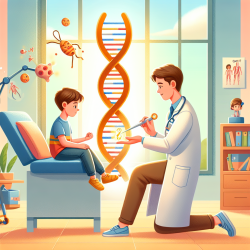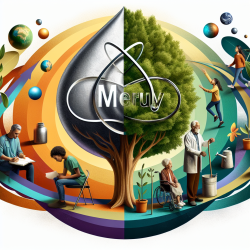Introduction
Guanidinoacetate methyltransferase (GAMT) deficiency is a rare genetic disorder that disrupts creatine synthesis, leading to severe neurological and behavioral abnormalities in children. Traditional treatments, such as oral creatine supplementation, have limited efficacy. However, recent research offers a promising alternative: gene therapy. The study titled "Gene therapy for guanidinoacetate methyltransferase deficiency restores cerebral and myocardial creatine while resolving behavioral abnormalities" provides compelling evidence for the effectiveness of this approach.
Key Findings from the Research
The study utilized an adeno-associated virus (AAV)-based gene therapy to express human codon-optimized GAMT in hepatocytes. The results were remarkable:
- Normalization of plasma creatine levels
- Significant reduction in guanidinoacetic acid (GAA) levels
- Restoration of cerebral and myocardial creatine levels
- Resolution of behavioral abnormalities in treated mice
These findings suggest that gene therapy can address both the biochemical and behavioral symptoms of GAMT deficiency, offering a comprehensive treatment solution.
Implications for Practitioners
For speech-language pathologists and other practitioners working with children affected by GAMT deficiency, these findings have several important implications:
1. Comprehensive Treatment Approach
Gene therapy offers a holistic treatment approach that addresses both the biochemical and behavioral symptoms of GAMT deficiency. This could lead to significant improvements in the quality of life for affected children.
2. Improved Behavioral Outcomes
The resolution of behavioral abnormalities observed in the study suggests that gene therapy could help normalize behavior, making it easier for children to engage in therapy and other interventions.
3. Long-term Efficacy
The study demonstrated sustained improvements in creatine levels and behavior over a long period, indicating that gene therapy could provide lasting benefits.
Encouraging Further Research
While the study's findings are promising, further research is needed to translate these results from animal models to human patients. Practitioners are encouraged to stay updated on advancements in gene therapy for GAMT deficiency and consider participating in clinical trials or research studies.
Conclusion
The study on gene therapy for GAMT deficiency offers a promising new treatment avenue that could significantly improve outcomes for affected children. By addressing both biochemical and behavioral symptoms, this approach has the potential to transform the standard of care for this challenging disorder.
To read the original research paper, please follow this link: Gene therapy for guanidinoacetate methyltransferase deficiency restores cerebral and myocardial creatine while resolving behavioral abnormalities.










